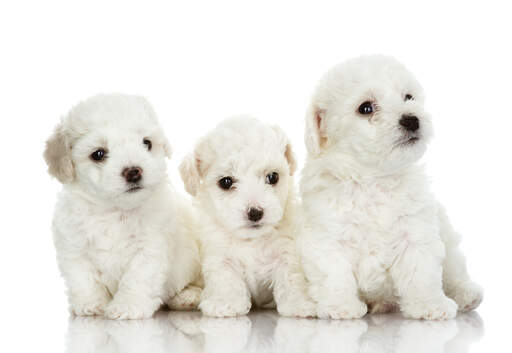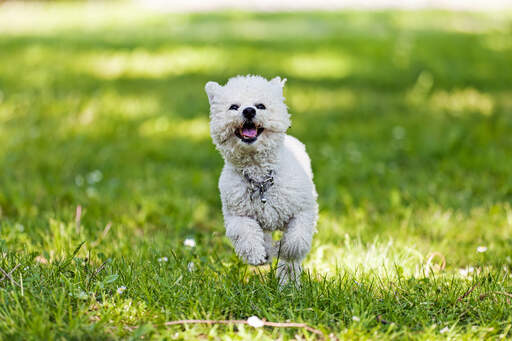Bichon Frise Dogs






History
The Bichon Frise was first bred in the Mediterranean as a family of dogs known as Barbichons (later Bichons). There were soon four types - the Maltese, Havanese, Bolognese and Tenerife. The modern Bichon Frise is thought to have been developed from the Tenerife variety. It was brought to Italy by sailors and soon became a popular dog with the aristocracy there. Over the years they became popular with the ordinary citizens of Italy, and, on account of their ability to learn cute tricks, were used by street performers.
Behaviour
The Bichon Frise is friendly and playful and loves human company. They are good with children, strangers, other dogs, and other pets too (usually). They enjoy being the centre of attention and will follow you around, hoping to be included in whatever you are doing. This makes them unsuitable for anyone who leaves the apartment or house for much of the day, as the dogs hate being alone. In these circumstances they can become destructive. They are sensitive to your mood and responsive to changing situations.
Bichons have a good sense of hearing and will bark at the slightest sound. They bark a lot, in fact, so early training is important to prevent this becoming a problem for you and your neighbors. The upside of this habit is that they make good, feisty watchdogs, always on the alert. Early training recommended - Bichons are clever and enjoy learning. They will want to please you, which makes training fairly easy. They need daily exercise in the form of short walks. As long as there are people around, the dog will be content. They will happily cuddle up to you on the sofa, or sit patiently in the car on trips to the shops.
Bichons are hypoallergenic dogs, and tend not to leave hair on the furniture (they do shed, but the hair tends to stick to itself). Regular brushing and stripping will prevent matting. Many owners opt for a 'puppy cut' with the coat trimmed cute and short.
One downside with this breed is that it is notoriously difficult to house train.
Temperament
The Bichon Frise is sociable, friendly, and dependent on ts human family. They hate being left alone and will soon fret and become destructive. They are full of playful energy and do well with children and other pets. House training is difficult, though.
If you give Bichons daily exercise daily and a comfy spot on the sofa, you will have a friend for life.
Health Problems
Bichon Frises are prone to patellar luxation (dislocation of the kneecap), eye disease, and canine hip dysplasia (CHD). Coat maintenance is very important, and neglected it is likely to result in skin problems.
Breed Details
- Status: Common
- Life Expectancy: 12 - 13 years
- Weight: 11 - 22 lb
- Height: 9.5 - 11.5"
- Rare: No
- Coat: Medium - Hypoallergenic
- Grooming Requirements: Everyday
- Town or Country: Either
- Minimum Home Size: Flat
- Minimum Garden Size: No Garden
- Breed Type: Toy Dog
- Size: Small
- Energy Level: High
Bichon Frise Pictures












